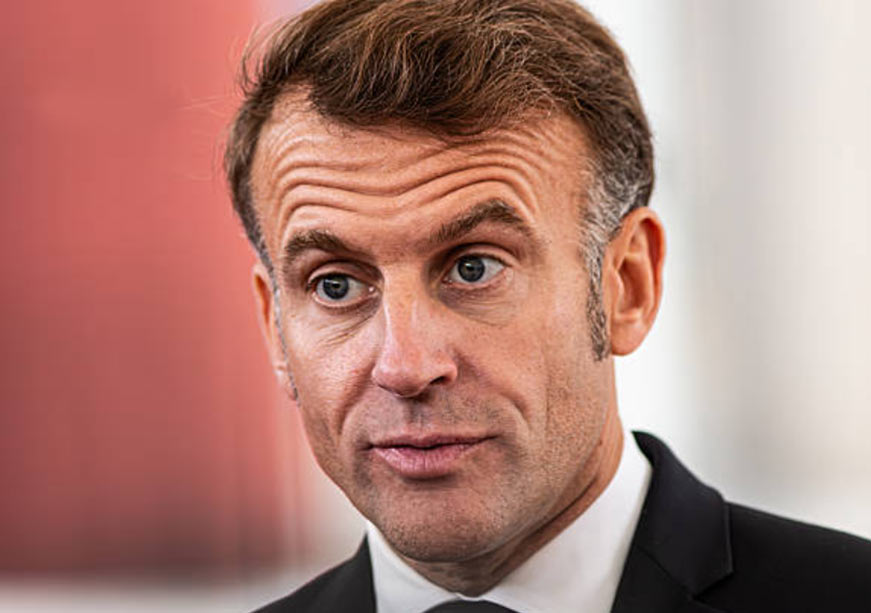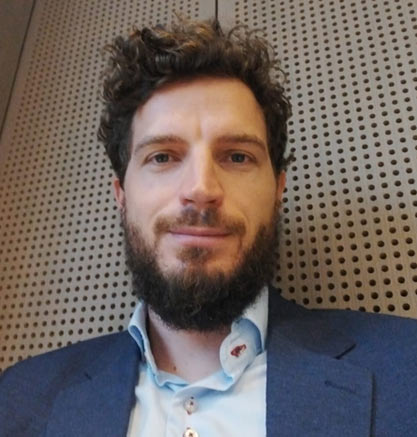-
CENTRES
Progammes & Centres
Location
As France battles political paralysis, Macron’s presidency leans outward—seeking global relevance amid deepening domestic instability.

Image Source: Getty Images
Following Emmanuel Macron’s re-election in the spring of 2022, expectations were rekindled for a period of stability and policy continuity in France. Naturally, after reeling from the Russian invasion of Ukraine and the lingering effects of COVID-19, the French were not voting for change. As a result, the elections were quickly expedited, with a short and muted campaign. Emmanuel Macron was sworn in for a second term without much fanfare, while the far-right candidate of the National Rally, Marine Le Pen, scored higher than ever, securing 45 percent of the votes during the runoff.
Nonetheless, the “polycrisis” facing the country and Europe, at large, would come home to roost very quickly and that too, in unexpected ways. Since the presidential election is ordinarily synchronised with the legislative ones being conducted in quick succession, the presidential parliamentary bloc often benefits from the popularity of the newly elected President, who then gets a majority to govern. However, the fragmentation of the French electorate on display in 2022, underscored by the far-right National Rally’s ascent, signalled that Macron’s second term would be far more politically constrained than his first.
For much of its history, France’s National Rally (RN), which is the successor to the National Front founded by Jean-Marie Le Pen, has remained on the fringes of the political establishment. This has been due to a “cordon sanitaire” designed to prevent the party’s candidates from winning seats. Furthermore, political opponents have formed a “united front” against it, a situation further reinforced by the ‘two-round’, majoritarian voting system used in the legislative elections.
The fragmentation of the French electorate on display in 2022, underscored by the far-right National Rally’s ascent, signalled that Macron’s second term would be far more politically constrained than his first.
This time, the loosening of this tacit understanding and the shifting voters’ mood meant that the RN was able to capture more seats than ever, alongside the reinvigorated ‘united front’ of the left. This combination of factors—coupled with the unprecedented abstention (with over half the electorate staying away from the polls)—paved the way for an electoral rout of Macron’s ruling party. For the first time in almost 25 years, not even a single party or coalition from the 2022 legislative elections emerged with an absolute majority to govern, leaving Macron’s post-victory mandate hollow and his ability to govern severely difficult.
In an attempt to break this logjam, Macron called for early legislative elections in the summer of 2024. Planned officially due to his ruling party’s defeat in the European elections a few weeks earlier, Macron’s party ended up with an even more fragmented polity and parliament, once again failing to secure a majority or the ability to have a stable and lasting prime minister.
Indeed, the French Fifth Republic is often described as a presidential system. However, it is more akin to a hybrid parliamentary system with a strong executive. According to the French Constitution, the president is an “arbitrator” while the prime minister, nominated by him but responsible before the parliament, is the one, along with the government, who “shall determine and conduct the policy” of the nation.
Thus, when the political hues of the prime minister and president are not fully in sync—also known as “cohabitation”—the latter becomes a ‘distant’ arbitrator and falls back on core national interests such as defence and external affairs. On the other hand, the prime minister takes the lead in crafting policies with the support of their parliamentary majority.
For the first time in almost 25 years, not even a single party or coalition from the 2022 legislative elections emerged with an absolute majority to govern, leaving Macron’s post-victory mandate hollow and his ability to govern severely difficult.
While the French political elite, ruling party, and media could turn their attention to the domestic turmoil, the president, in accordance with the constitution, would shift his focus to world affairs, serving as the primary decision-maker in aspects related to international relations.
Therefore, since 2022, President Macron has been able to prioritise attending summits and representing France on the world stage. Furthermore, he is often accompanied by government heavyweights while the prime minister navigates domestic turmoil.
This flurry of activity is best epitomised in the Indo-Pacific, where President Macron has amply demonstrated France’s commitment and interest in the region, especially in light of its Defence Strategy published in 2019 and in 2022 at the interministerial level, last updated in 2025. Alongside its longstanding strategic partners, such as India, where Macron was invited as the Chief Guest for Republic Day 2024, the French President has also toured multiple countries where no French president has ever set foot before. For instance, in 2023 alone, Vanuatu, Papua New Guinea, Sri Lanka, and Mongolia were included on the list. In addition, other nations where no official visit had been made for multiple decades were part of this endeavour, such as Bangladesh and Uzbekistan.
Multilateral fora were given equal prominence in the President's foreign presence. He attended the G20 in Indonesia and India, as well as the Asia-Pacific Economic Cooperation (APEC) in Thailand. Recently, he also convened as the keynote speaker for the 2025 edition of the Shangri-La Dialogue.
This flurry of activity is best epitomised in the Indo-Pacific, where President Macron has amply demonstrated France’s commitment and interest in the region,
These commitments have helped boost France’s influence in the Indo-Pacific region, reinforced on the security side by the resident power status of Paris in the area, as highlighted by the longstanding commitment of the French Armed Forces to participate in numerous deployments in the Indian Ocean Region (IOR) and the wider Indo-Pacific. Some of these initiatives also coincided with the President’s visit, such as the Aircraft carrier group mission ‘CLEMENCEAU’ from Djibouti to the Pacific Ocean, passing through the Indian Ocean and the South China Sea (SCS) earlier in 2025.
In 2024, the French Air Force flew over the entire region alongside its German, Spanish, and British counterparts, showcasing interoperability with multiple partners—most notably the Indian Air Force—by participating in exercise ‘Tarang Shakti’ at the Sulur Air Force base.
This diplomatic and military activity is not limited to the Indo-Pacific, as witnessed by President Macron and Saudi Arabia’s de facto ruler, Mohammed bin Salman’s joint initiative to recognise a Palestinian State, or the President's active engagement with stakeholders in Lebanon to obtain a lasting ceasefire. One can also consider its leading role in bridging the United States (US)-European Union (EU) divide over Ukraine following the advent of Trump’s presidency, where Macron emerged as the “elder” among the major European countries and the one who has engaged with President Trump since his first term in 2017.
In these foreign outreaches, Macron’s vision is somewhat reminiscent of De Gaulle’s ‘third way’, which is today being recast as ‘strategic autonomy’. It is a DNA that France shares with India and its ‘multi-aligned’ foreign policy. This does not imply a dissipation of France’s traditional commitment to its allies, nor an equidistant approach to world issues, as highlighted by Macron’s posture on the Israel-Palestine issue, the Russia-Ukraine war or the growing Chinese assertiveness in the SCS. This is a timely reminder of the uniqueness of the French position, which, while coordinating with European and transatlantic partners on numerous strategic issues, remains independent at the core.
In these foreign outreaches, Macron’s vision is somewhat reminiscent of De Gaulle’s ‘third way’, which is today being recast as ‘strategic autonomy’.
Today, Macron’s handling of foreign relations has been relatively shielded from the fallouts of domestic turmoil, but will this global presidency be jeopardised by the ever more precarious state of French politics?
The arbitrator may need to engage more with the complexities of French politics to prevent a complete breakdown of administrative and financial functions. Not unlike the US “shutdown”, France needs to pass a budget before the end of the year if it wants its government and economy to function smoothly. On the other hand, the international financial markets will serve as a constant reminder that France needs to put its house in order if it wants to avoid a new eurozone crisis.
The task ahead appears to be an uphill one: short of new legislative elections, the president can only nominate a prime minister who will then have the unenviable job of passing major reforms without a majority, thus rendering the necessity of finding a parliamentary coalition for each law.
With the option of resigning before his term ends in 2027 seeming largely unpalatable, Macron might find solace in drawing inspiration from other parliamentary democracies that have, over time, perfected the art of running alongside coalition government—be it in neighbouring Berlin or further away in New Delhi.
Guillaume Gandelin is a Visiting Fellow with the Strategic Studies Programme at the Observer Research Foundation.
The views expressed above belong to the author(s). ORF research and analyses now available on Telegram! Click here to access our curated content — blogs, longforms and interviews.

Guillaume Gandelin is a Visiting Fellow with the Strategic Studies Programme, Observer Research Foundation. His research focuses on the India-EU and India-France security and defence ...
Read More +